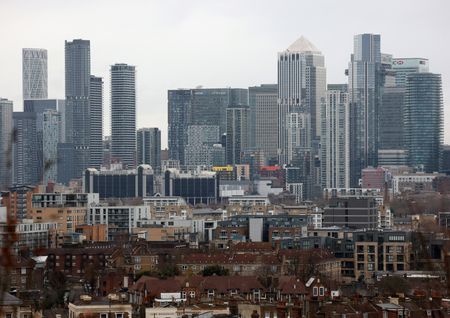By David Milliken
LONDON (Reuters) – Britain’s housing market slowed last month after the end of a temporary tax break on home purchases which had seen buyers rush to complete transactions in previous months, an industry survey showed on Thursday.
The Royal Institution of Chartered Surveyors’ monthly house price balance fell to -3 in April from March’s +2, its lowest reading since July 2024, while the number of sales agreed dropped by the most since August 2023.
“Although geopolitical developments haven’t helped the mood music in the residential market over the past month, the main reason for the dip in the key RICS sales activity metrics lies in the expiry of the stamp duty holiday at the end of March,” RICS chief economist Simon Rubinsohn said.
The weak RICS reading chimed with a report from mortgage lender Nationwide last week that showed house prices sank by 0.6% in April.
However, a survey from another lender, Halifax, on Thursday pointed to a 0.3% increase in house prices last month.
“The market continues to show resilience despite a subdued economic environment and risks from geopolitical developments,” said Halifax head of mortgages, Amanda Bryden.
U.S. President Donald Trump announced wide-ranging import tariffs on April 2, leading to a temporary selloff in U.S. government bonds that spilled over to British financial markets, briefly pushing 30-year British government bond yields to their highest since 1998.
Shorter-dated gilt yields – which have a more direct impact on mortgage costs – were less affected and have continued to fall on expectations that the BoE will cut interest rates faster due to the weaker global economic outlook expected by many analysts as a result of the tariffs.
The BoE is expected to cut its main interest by 0.25 percentage points to 4.25% later on Thursday and may signal greater openness to cutting rates faster than the quarterly pace it has adopted up to now.
RICS said its members expected lower interest rates to put upward pressure on house prices over the coming year though the immediate outlook remained soft.
Strong upward pressure was seen for rents, as fewer landlords let out properties while demand from tenants continued to climb.
“Even with the rise in the build to rent to sector the shortfall of affordable rental stock looks set to remain substantial,” Rubinsohn said.
(Reporting by David Milliken, additional reporting by Andy Bruce; Editing by Toby Chopra)










